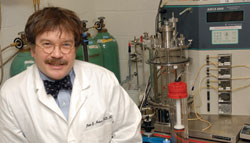|

Researcher of Neglected Disease

|

Peter Hotez recently was elected to membership in the prestigious Institute of Medicine at the National Academies.
Jessica McConnell
|
When Peter Hotez was 14 years old, he owned copies of the textbooks Tropical Diseases and Clinical Parasitology. So it is no surprise that Dr. Hotez, Walter G. Ross Professor and chair of the Department of Microbiology, Immunology, and Tropical Medicine at the GW Medical Center, has dedicated his life to addressing and curing tropical diseases.
Well versed in molecular chemistry, biology, and biochemistry from high school and his undergraduate studies at Yale University, Dr. Hotez focused on parasitic diseases, specifically hookworm disease, in a dual PhD/MD degree program at Rockefeller University in New York and at Cornell University Medical Center. He came to GW in 2000 with a grant from the Sabin Vaccine Institute and Bill & Melinda Gates Foundation to start the Department of Microbiology, Immunology, and Tropical Medicine.
Since then, Dr. Hotez and his team of scientists and graduate students have worked on designing innovative interventions for the major “neglected” tropical diseases that affect the poorest 1 billion people living in the developing regions of sub-Saharan Africa, Southeast Asia, and Central and South America.
“GW is a one-stop shop on neglected diseases with research, product development, clinical testing, and policy,” says Dr. Hotez. “Our group is uniquely devoted to diseases of poverty in developing countries. These diseases are as important as HIV/AIDS yet no one has heard of them, because they aren’t on the radar screen.” He explains that unlike HIV/AIDS, which also affects many in North America and Europe, tropical diseases occur only among the poorest people in developing countries. “These are forgotten diseases among forgotten people,” he says.
In collaboration with the Sabin Vaccine Institute, a nonprofit medical research and advocacy organization located adjacent to GW, Dr. Hotez’s team has established a Global Network for Neglected Tropical Disease Control. The network is an alliance of the major public-private partnerships committed to mass drug administration for the large-scale control of the seven most common neglected tropical diseases. This effort includes the development of an innovative and low-cost drug package known as a “rapid impact package” that can be administered for as low as 50 cents per person per year. According to Dr. Hotez, the package has already been distributed to more than 34 million people in Rwanda, Burundi, and other African countries.
Dr. Hotez and his team also are developing vaccines for two of the most prevalent tropical diseases: schistosomiasis and hookworm, both caused by a parasitic worm. Schistosomiasis can cause liver and intestinal disease, impair growth in children, and lead to bladder cancer and liver and kidney malfunctions. Hookworm’s effects include severe anemia and protein malnutrition.
Dr. Hotez says the hookworm vaccine has taken many years to develop and currently is being tested in Brazil, where the department, together with the Sabin Vaccine Institute, has a clinic in a parasitic disease-endemic area of the Minas Gerais state. In order to create and test the vaccine, Dr. Hotez established a product development partnership between GW and Sabin known as the Human Hookworm Vaccine Initiative.
Dr. Hotez says tropical diseases, many of which are caused by parasitic worms, contribute to a cycle of poverty in which those afflicted can become disabled and lose their jobs, or become disfigured, and stigmatized by their family and community. The diseases also can impair child development and education because of their impact on memory and cognition.
“Our work is important because it’s the best opportunity for lifting poor people in developing countries out of poverty,” he explains. “These diseases not only affect health but also education and economic development.”
Dr. Hotez can see a branch of the World Health Organization, a World Bank office, and the State Department Office of the U.S. Global AIDS coordinator out of his office window in Ross Hall—all reasons, he says, that make GW the logical place to spearhead tropical disease research and development.
“We are in the world center of global health,” he says. “What a perfect place to embark on work on tropical diseases of impoverished countries. This is the best place to be.”
—Julia Parmley
|